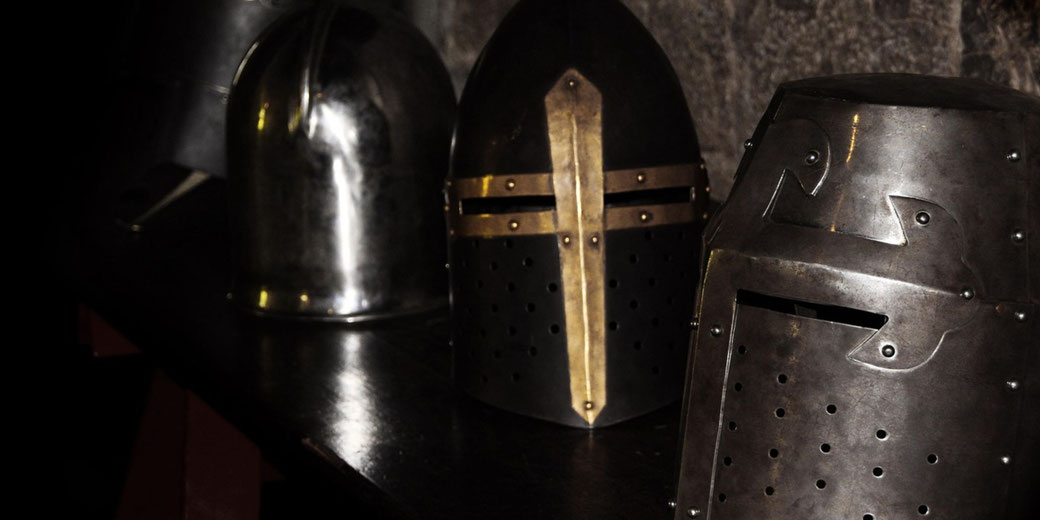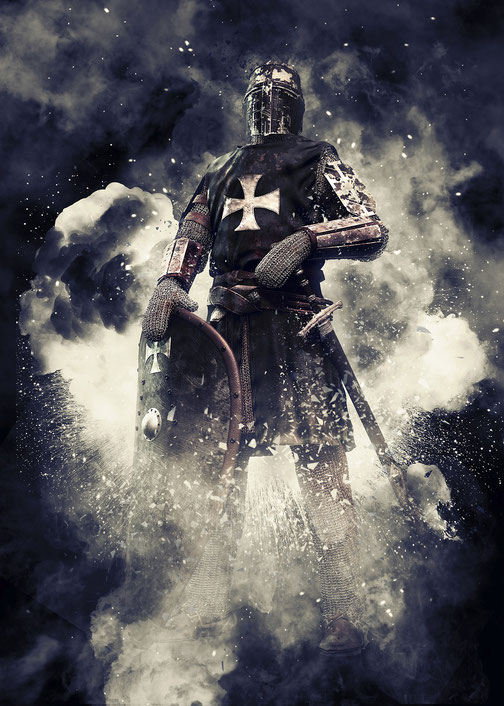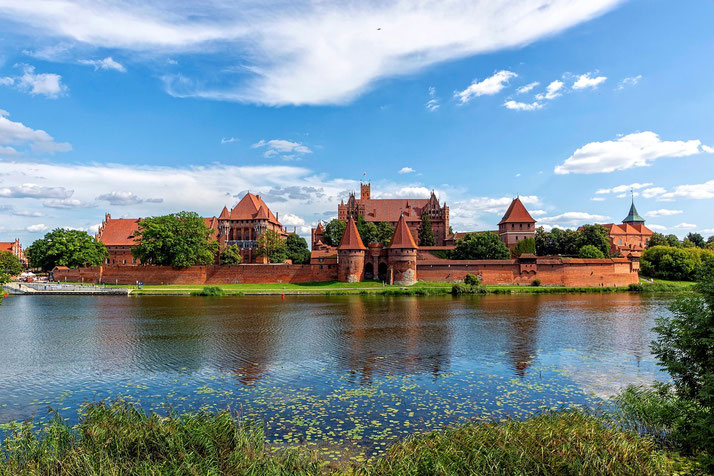The dark history of the medieval Teutonic Knights

Born out of the conflict of the Third Crusade, the Teutonic Knights rose primarily from modest beginnings as a hospital brotherhood in the Holy Land into a military religious order that ruled its own church-run state in Eastern Europe.
Behind their religious vows and devout rituals, the Order developed a reputation for brutal conquest and often for forced conversions, and it carried out the organised suppression of pagan societies.
Over time, they carved out a territory that stretched from the Vistula River to Livonia, building stone fortresses on many conquered lands and enforcing Latin Christianity with fire and sword.
Origins and Founding of the Order
The origin of the Teutonic Order is commonly traced to the siege of Acre in 1190, where a group of German crusaders from Bremen and Lübeck established a field hospital to care for sick and wounded pilgrims.
With support from Duke Frederick of Swabia, this early brotherhood had received formal Church recognition soon after when, in 1198, Pope Innocent III authorised its transformation into a military order.
Heinrich Walpot von Bassenheim, who had become the first Grand Master, led the new institution after this transition.
Officially named the Order of the German House of Saint Mary in Jerusalem, it adopted the rules of the Templars and Hospitallers.
The Rule of the Teutonic Order, which had been formally approved the following year, combined parts of both orders, but balanced church and military responsibilities.
At first, the Order focused primarily on charitable service and the protection of Christian travellers.
As the Latin Crusader states began to weaken, the knights shifted their efforts.
They increasingly came to see military conquest as a more effective method of defending Christendom.
Over the next few decades, they acquired land and privileges from the Holy Roman Empire and developed a network of commanderies that provided important income and supply support for future campaigns.
This early expansion had largely laid the groundwork for their transition into an independent military force operating along the northeastern frontier of Europe.

Purpose and Vows of the Teutonic Knights
Each member of the Teutonic Order typically took vows of chastity and poverty, together with strict obedience, committing themselves to a religious rule inspired by the Cistercian model.
By taking these vows, knights renounced all private property and submitted fully to the authority of the Grand Master.
Their official purpose was ostensibly to defend Christians and to fight heretics and pagans, actions that also upheld the Church's interests.
In practice, as their influence expanded, their actions often aligned more closely with political control and territorial conquest.
Importantly, their organisation acted as both a monastic community and a standing army.
They established commanderies, or “komturei,” across their domains, which they used to train soldiers, collect taxes and manage the movement of supplies.
Members wore a distinctive white mantle bearing a black cross, a symbol approved by the Pope.
The Teutonic Knights received significant donations from German nobles, who often saw the Order as a path to spiritual merit and social advancement.
Their status also attracted young aristocrats who valued the combination of religious devotion and military prestige.
At their height, the Order counted about 700 knight-brothers, supported by a much larger force of sergeants, squires, mercenaries, and local support troops.
As time passed, their military aims outgrew their religious mission. Papal support gave their actions a spiritual justification, yet their campaigns focused increasingly on expanding their state.
Forced conversion and castle construction became standard tactics, accompanied by the suppression of local customs.
By the early 13th century, the Order had shifted its attention away from the Holy Land and toward the Baltic, where pagan societies such as the Old Prussians, Curonians, and Samogitians still resisted Christianity.
Their involvement in the Northern Crusades
Pope Celestine III called for crusades in the Baltic as early as the 1190s, and his successors generally reinforced the idea that paganism in northern Europe must be eliminated.
The Teutonic Knights answered this call by taking up arms against the Baltic peoples.
Initially, they primarily targeted the Prussians, but over time, their campaigns spread to Livonia and Lithuania.
Under the protection of papal bulls and imperial charters, they had largely secured both religious authority and legal backing for their expansion.
For most military campaigns, the Order relied on reinforcements and donations from German-speaking territories, which they used these resources to build a network of defensive castles along key rivers and roads.
Castles such as Marienburg acted as administrative centres, military bases and visible symbols of conquest.
Local resistance was commonly met with severe punishment, including the destruction of villages, forced baptisms and the execution of tribal leaders.
Pagan rituals and burial customs were banned, sacred groves were replaced with churches, and schools established by monastic clerics, which taught the Latin liturgy.
Prussian Crusade (1230-1283)
In 1226, Duke Konrad of Masovia invited the Teutonic Knights to help him fight the Prussian tribes who raided his lands.
To secure their cooperation, he offered them territory on the frontier. Emperor Frederick II granted legal guarantees that same year through the Golden Bull of Rimini, which confirmed that any lands conquered in Prussia would belong solely to the Order.
The formal conquest began a few years later, around 1230.
Over five decades, they attacked Prussian fortresses, razed villages and eliminated tribal leaders.
When resistance proved strong, they often responded with more force. For example, during the Great Prussian Uprising (1260–1274), the Order suffered several setbacks, but additional troops from the Rhineland and Thuringia helped put down the rebellion.
By 1283, the knights had completed their conquest. Some modern estimates suggest that a large part of the Prussian population was likely either killed or forced to leave during the campaign.
After they had gained control, they introduced a system of land division and settlement in which German-speaking colonists were often brought in to cultivate fields, run trade posts, and build towns under the Order’s control.
Local populations, meanwhile, were reduced to second-class status. Many were forced to abandon their language and customs.
The cultural loss experienced by the Prussians, once an independent and varied group of eleven tribes, was severe and largely permanent.
Livonian Crusade (1198-1290)
At the same time as their conquest of Prussia, the Teutonic Knights carried out a second campaign across the lands of modern-day Latvia and Estonia.
The Livonian Crusade began under Bishop Albert of Riga, who founded the city of Riga in 1201 and used it as a base for Christianisation.
He formed the Livonian Brothers of the Sword to wage war against the Livs, Letts, and Estonians.
For a time, they acquired territory and built castles, but they suffered a serious defeat in 1236 at the Battle of Saule.
Following that defeat, the surviving Sword Brothers had been absorbed into the Teutonic Order, after which the knights then took control of the Livonian campaign and reorganised it largely using an administrative system that they controlled.
They built new castles at key points, launched further raids into pagan territory, and conducted public baptisms under armed supervision.
To secure their holdings, they often expelled or executed local elites, whom they replaced with German officials.
The main challenge came from Lithuania, which remained largely pagan and a military power.
Its rulers, including Mindaugas and Traidenis, resisted conversion and launched raids into Teutonic-held territory.
Mindaugas accepted baptism in 1251 and was crowned king in 1253. After his assassination in 1263, conflict with the knights resumed, as Lithuania remained largely unconverted.
The resulting struggle dragged on for decades. Although the knights frequently launched invasions of Lithuania, they failed to conquer it by force.
After 1386, Grand Duke Jogaila converted to Christianity as part of his marriage to the Polish queen.
This peaceful conversion significantly weakened the Order’s claim to be defenders of Christendom and largely took away their justification for continued war.
Decline and Secularization
After decades of control, the Teutonic Knights suffered a major defeat in 1410 at the Battle of Grunwald, during which the Polish-Lithuanian army caused heavy losses and killed Grand Master Ulrich von Jungingen during the fighting.
This defeat ended the Order’s ability to act as an independent military power.
Though they retained some territory, they became vulnerable to internal rebellion and foreign pressure.
The subsequent Peace of Thorn (1411) imposed heavy reparations, which significantly drained their finances.
Soon after, the Thirteen Years’ War (1454–1466) weakened the Order further, as they lost western Prussia to Poland and were forced to acknowledge Polish overlordship.
Their capital moved from Malbork to Königsberg, a symbolic retreat that clearly showed their declining status.
Economic hardship, reduced recruitment, and political interference gradually and steadily weakened the Order’s independence.
The Second Peace of Thorn (1466) formalised the division of their state, splitting it into Royal Prussia and the smaller Teutonic-controlled region.
Eventually, in 1525, Grand Master Albert of Brandenburg adopted Lutheranism and converted the remaining territory into the secular Duchy in Prussia.
He became a vassal of the Polish king and the first Duke in Prussia, which began the Hohenzollern line.
As a result, the Teutonic Order lost its religious character, and its military structure collapsed.
Though a Catholic branch continued as a charitable institution in Austria, it never fully recovered its influence.
The Order's image as sacred warriors would later be adopted by German nationalist ideologies, including those that promoted the so-called "Drive to the East" in the nineteenth and twentieth centuries.

What do you need help with?
Download ready-to-use digital learning resources
Copyright © History Skills 2014-2025.
Contact via email
With the exception of links to external sites, some historical sources and extracts from specific publications, all content on this website is copyrighted by History Skills. This content may not be copied, republished or redistributed without written permission from the website creator. Please use the Contact page to obtain relevant permission.





